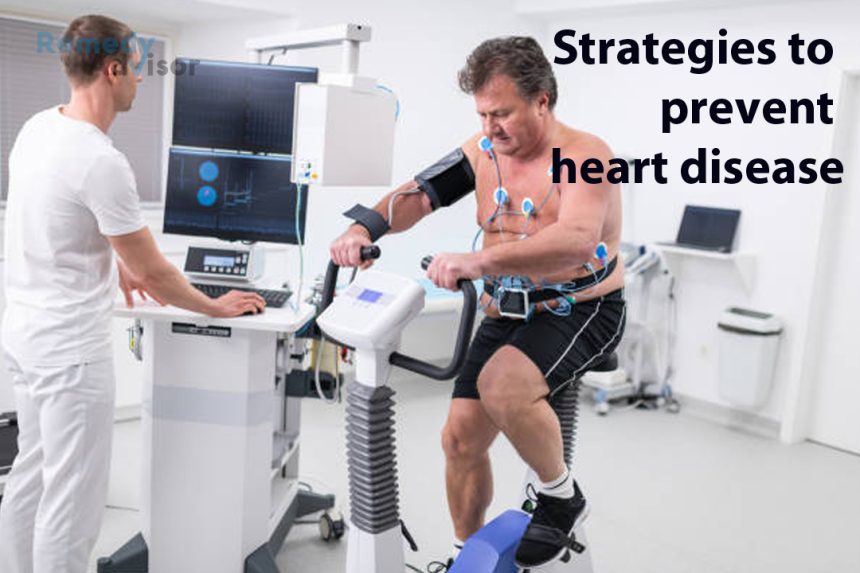How can you minimize your risk of heart disease? Most Americans are already familiar with the basics
• Don’t smoke
Heart damage from tobacco causes 150,000 fatal heart attacks a year.
• Eat less fat (especially saturated fat)
Less fat means lower cholesterol levels and reduced risk of obesity.
• Watch your blood pressure
A reading of 135/85 elevates the risk for heart attack and stroke. One in the normal range (below 120/80) is better.
• Get regular exercise
If you’re already making these efforts, terrific. But there’s much more you can do to protect yourself.
What causes heart disease
Heart disease occurs via a three-step process:
Step 1: Levels of LDL (bad) cholesterol get too high and/or levels of HDL (good) cholesterol fall too low. Ideally, your total cholesterol should be under 200. Your level of HDL should be at least 35. Your ratio of total cholesterol to HDL cholesterol should be 4.5 to 1 or lower.
Step 2: The arterial lining is injured usually via smoking or by having high blood pressure or blood sugar levels. This injury facilitates the entry of cholesterol from the blood into the artery wall.
Step 3′: A blood clot forms. The growing cholesterol deposit disrupts the flow of blood. That causes blood clots to form. Eventually, a clot blocks the artery, causing a heart attack.
Lesson: A comprehensive heart disease prevention program must take aim at each step.
Eat less salt
If you have hypertension, the less salt you eat, the lower your blood pressure is likely to be. And the lower your blood pressure, the smaller your risk of heart disease.
Tossing the salt shaker is a good start. But 75% of the sodium in a typical diet comes from salt that is hidden in processed foods.
Self-defense: Read labels. A bowl of canned soup can have up to 1,200 milligrams (mg) of sodium. That’s half the 2,400-mg-perday level recommended by health experts.
More potassium and calcium
Potassium has just the opposite effect of sodium more means reduced blood pressure. But there’s no evidence to suggest that blood pressure can be lowered by taking potassium supplements.
Better: Increase your intake of potassium rich foods, such as bananas, oranges, dates, lima beans and potatoes.
Calcium also seems to play a key role in lowering blood pressure. For instance, blood pressure levels tend to be unusually low among people who live in areas with hard (calcium-rich) water and among those who eat lots of dairy products
Lesson: If you are concerned about your blood pressure, eat more nonfat dairy products, dark green vegetables and tofu (bean curd). Also: Ask your doctor about taking Turns or another calcium supplement.
Get more dietary fiber
Dietary fiber helps prevent heart disease by lowering cholesterol, blood pressure and blood sugar.
Sadly, most Americans get only one-third of the recommended 30 daily grams (g) of fiber.
Sources of dietary fiber
Beets, Beans, prunes, grains and citrus fruits are the source of dietary fibers. It’s a good idea to start your day with a breakfast cereal containing at least 10 g of fiber per serving.
Eat fish twice a week

Heart disease is quite uncommon among people who eat lots of fish. Certain unsaturated fatty acids unique to fish are thought to be responsible for this protective effect.
Heart patients must eat at least four ounces of fish a week. Best: Rich, oily species like bluefish, mackerel, tuna and salmon.
What about fish-oil supplements? There’s little evidence that they’re beneficial.
Alcohol and aspirin
Study after study has proven that an occasional drink raises levels of HDL cholesterol. Men whose HDL is below 30 should consider having one or two drinks daily (one if you’re a woman). One drink equals a glass of wine, a shot of distilled spirits or 12 ounces of beer.
Low-dose aspirin therapy one-half tablet a day is proven to prevent heart attacks in those who have heart disease.
Aspirin may also be beneficial for individuals at risk for heart disease. That includes men over 30 and postmenopausal women. There’s no evidence that preventive aspirin therapy is beneficial to people with healthy hearts.
Caution: If you’re allergic to aspirin, have ulcers or are prone to digestive bleeding, aspirin therapy is not for you.
Consider taking antioxidants
Cholesterol damages arteries when it has been oxidized, via a chemical reaction analogous to rusting.
Fortunately, the body has enzymes that prevent oxidation by “mopping up” the unstable molecules (free radicals) that cause oxidation. Three antioxidant nutrients vitamins C and E and beta-carotene give this natural defense system a big boost, especially when taken in combination.
Sufficient levels of beta-carotene can easily be obtained by eating green and yellow vegetables, and vitamin C is abundant in citrus fruits. But it’s hard to get much vitamin E from dietary sources, so taking a daily supplement is best.
What about other supplements?
There’s been much less research on chromium than on the “big three” antioxidants. But in one study, volunteers took 200 micrograms of the mineral three times a day.
Result: Levels of protective HDL cholesterol rose by 16%. That translates into a 20% reduction in the risk of heart disease.
If your HDL level is below 30, and it cannot be raised via weight loss, exercise or moderate alcohol consumption, ask your doctor about taking chromium supplements.
Important:
Glucose tolerance factor (GTF) seems to be safer than the more popular supplement, chromium picolinate.
In another study involving more than 15,000 physicians, researchers found that those whose blood contained high levels of the amino acid homocysteine were more likely to have a heart attack. Homocysteine seems to damage artery walls and promote clotting.
To keep homocysteine levels down
Take a daily supplement containing vitamins B-6 and B-12 and folic acid.
Medical tests
Your blood pressure, cholesterol and blood sugar should be checked each time you have a physical exam. That’s once every year for people 30 or older and once every two to three years for people 35 to 49 years of age.
I’d also suggest an electrocardiogram with each checkup. Stress tests aren’t necessary unless you’re having chest pains or other heart disease symptoms.







